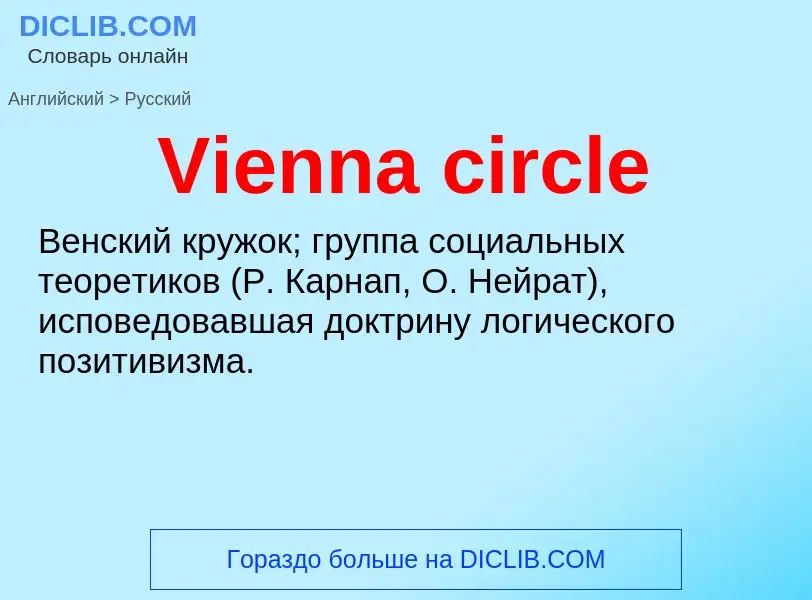Traducción y análisis de palabras por inteligencia artificial ChatGPT
En esta página puede obtener un análisis detallado de una palabra o frase, producido utilizando la mejor tecnología de inteligencia artificial hasta la fecha:
- cómo se usa la palabra
- frecuencia de uso
- se utiliza con más frecuencia en el habla oral o escrita
- opciones de traducción
- ejemplos de uso (varias frases con traducción)
- etimología
Vienna circle - traducción al ruso
[vi'enə]
существительное
география
г. Вена
Definición
Wikipedia
The Vienna Circle (German: Wiener Kreis) of logical empiricism was a group of elite philosophers and scientists drawn from the natural and social sciences, logic and mathematics who met regularly from 1924 to 1936 at the University of Vienna, chaired by Moritz Schlick. The Vienna Circle had a profound influence on 20th-century philosophy, especially philosophy of science and analytic philosophy.
The philosophical position of the Vienna Circle was called logical empiricism (German: logischer Empirismus), logical positivism or neopositivism. It was influenced by Ernst Mach, David Hilbert, French conventionalism (Henri Poincaré and Pierre Duhem), Gottlob Frege, Bertrand Russell, Ludwig Wittgenstein and Albert Einstein. The Vienna Circle was pluralistic and committed to the ideals of the Enlightenment. It was unified by the aim of making philosophy scientific with the help of modern logic. Main topics were foundational debates in the natural and social sciences, logic and mathematics; the modernization of empiricism by modern logic; the search for an empiricist criterion of meaning; the critique of metaphysics and the unification of the sciences in the unity of science.
The Vienna Circle appeared in public with the publication of various book series – Schriften zur wissenschaftlichen Weltauffassung (Monographs on the Scientific World-Conception), Einheitswissenschaft (Unified Science) and the journal Erkenntnis – and the organization of international conferences in Prague; Königsberg (today known as Kaliningrad); Paris; Copenhagen; Cambridge, UK, and Cambridge, Massachusetts. Its public profile was provided by the Ernst Mach Society (German: Verein Ernst Mach) through which members of the Vienna Circle sought to popularize their ideas in the context of programmes for popular education in Vienna.
During the era of Austrofascism and after the annexation of Austria by Nazi Germany most members of the Vienna Circle were forced to emigrate. The murder of Schlick in 1936 by former student Johann Nelböck put an end to the Vienna Circle in Austria.


![Courtyard of the [[Museumsquartier]] with ''Enzi'' seating furniture Courtyard of the [[Museumsquartier]] with ''Enzi'' seating furniture](https://commons.wikimedia.org/wiki/Special:FilePath/13-05-24-wien-RalfR-073.jpg?width=200)
![Crowds greet [[Adolf Hitler]] as he rides in an open car through Vienna in March 1938 Crowds greet [[Adolf Hitler]] as he rides in an open car through Vienna in March 1938](https://commons.wikimedia.org/wiki/Special:FilePath/Bundesarchiv Bild 146-1972-028-14, Anschluss Österreich.jpg?width=200)

![''Vienna from Belvedere'' by [[Bernardo Bellotto]], 1758 ''Vienna from Belvedere'' by [[Bernardo Bellotto]], 1758](https://commons.wikimedia.org/wiki/Special:FilePath/Canaletto (I) 058.jpg?width=200)
![Many international organizations and offices are located in [[Donaustadt]]. Many international organizations and offices are located in [[Donaustadt]].](https://commons.wikimedia.org/wiki/Special:FilePath/Donaucity from Danube River to Northnorthwest - Vienna-.jpg?width=200)
![[[Ernst-Happel-Stadion]] in the Prater [[Ernst-Happel-Stadion]] in the Prater](https://commons.wikimedia.org/wiki/Special:FilePath/Ernst Happel Stadion.jpg?width=200)


![[[Karlskirche]], located on the south side of [[Karlsplatz]] in the 4th city district [[Karlskirche]], located on the south side of [[Karlsplatz]] in the 4th city district](https://commons.wikimedia.org/wiki/Special:FilePath/Karlskirche Wien September 2016.jpg?width=200)

![Depiction of Vienna in the ''[[Nuremberg Chronicle]]'', 1493 Depiction of Vienna in the ''[[Nuremberg Chronicle]]'', 1493](https://commons.wikimedia.org/wiki/Special:FilePath/Nuremberg chronicles f 098v99r 1.png?width=200)
![Albertina Terrace in the [[Innere Stadt]] Albertina Terrace in the [[Innere Stadt]]](https://commons.wikimedia.org/wiki/Special:FilePath/Opera-Vienna-Austria-2005.jpg?width=200)

![parliament]] parliament]]](https://commons.wikimedia.org/wiki/Special:FilePath/Sitzungssaal des Abgeordnetenhauses, Parlament, Wien.jpg?width=200)

![The [[University of Vienna]]'s main building The [[University of Vienna]]'s main building](https://commons.wikimedia.org/wiki/Special:FilePath/University Vienna Oct. 2006 002.jpg?width=200)
![Danube Tower]] in the nearby Donaupark before the extensive building work Danube Tower]] in the nearby Donaupark before the extensive building work](https://commons.wikimedia.org/wiki/Special:FilePath/Vereinte Nationen in Wien.jpg?width=200)
![Monument of [[Johann Strauss II]] at [[Stadtpark, Vienna]] Monument of [[Johann Strauss II]] at [[Stadtpark, Vienna]]](https://commons.wikimedia.org/wiki/Special:FilePath/Vienna - Johann Strauss Monument in Stadt Park - 4572.jpg?width=200)

-Allen.jpg?width=200)



![''[[Wiener Schnitzel]]'' ''[[Wiener Schnitzel]]''](https://commons.wikimedia.org/wiki/Special:FilePath/Wiener-Schnitzel02.jpg?width=200)
